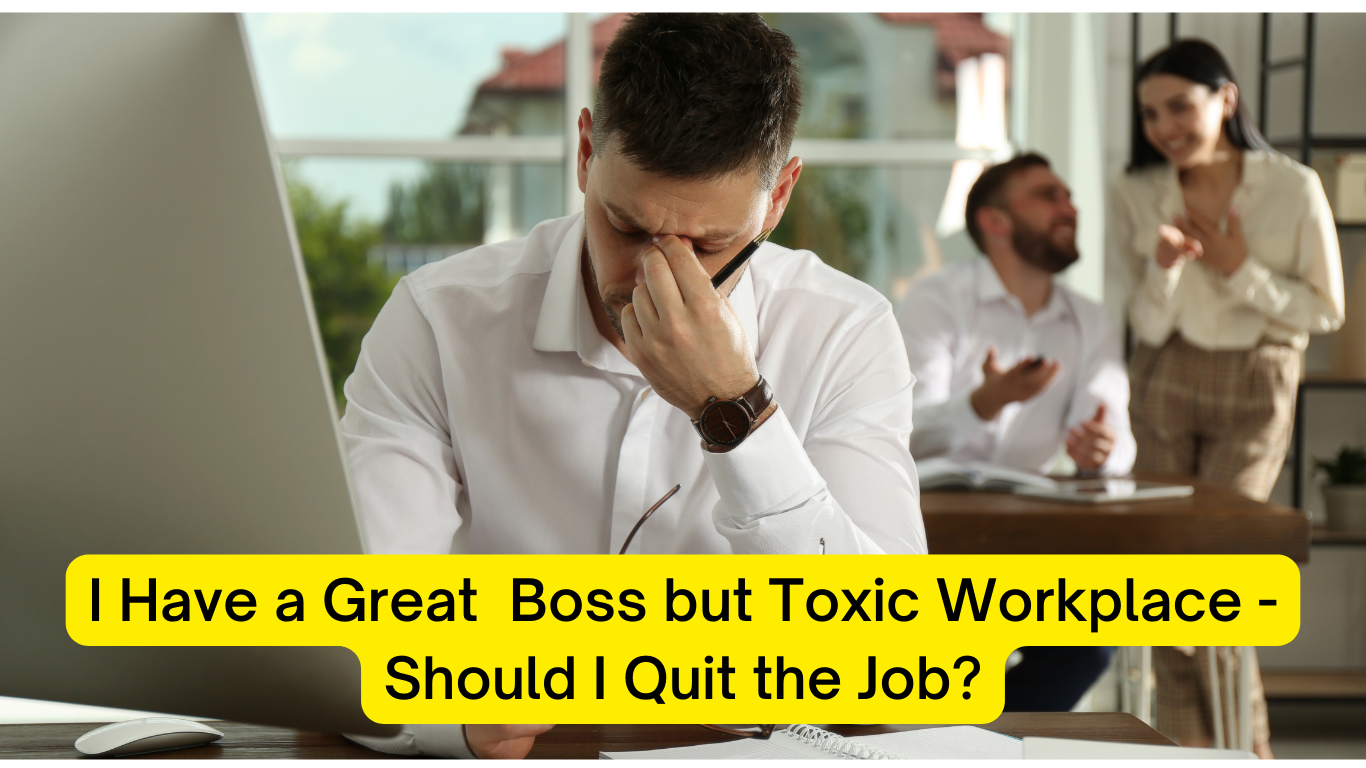Introduction
How to Quit a Job When Your Boss is Great But Workplace is Toxic- Quitting a job you enjoy but has a toxic work environment is an unfortunate yet common scenario many professionals face. Though you may like your boss and coworkers, a dysfunctional workplace culture can negatively impact your mental health and career growth. Recognizing the signs of toxicity and prioritizing your own well-being is critical, though certainly difficult. Leaving a job with a likable boss but unhealthy environment puts employees in a tough position. This article offers guidance on gracefully moving on from a toxic workplace, even if you want to preserve relationships.
Questions to answer:
- What are the signs of a toxic work environment?
- Why is it important to leave a toxic workplace even if you like your boss?
- How do you quit professionally when you want to preserve the relationship with your boss?
- What should you say when your boss asks why you’re leaving?
- How do you explain leaving a toxic work environment in a job interview?
Outline:
- Introduction
- Questions to answer
- Signs of a toxic workplace
- Why you should leave, even if you like your boss
- How to quit gracefully
- What to say in job interviews
- Be prepared for counteroffers
- How to preserve the relationship
- Set boundaries after leaving
- Key takeaways
Here are the Best Office Bags

Signs of a Toxic Work Environment
Working in a toxic environment can seriously impact your mental and physical health. Here are some common signs your workplace may be toxic:
- Constant drama, gossip, and backstabbing between coworkers (Source)
- Micromanaging and lack of trust from management (Source)
- Feeling excluded, isolated, or ostracized
- Little to no opportunities for professional growth and advancement
- Being overworked, leading to burnout and work-life imbalance
Toxic workplace behaviors can range from passive aggressiveness to outright harassment and bullying. If your workplace is full of negative undercurrents and feelings of distrust or inadequacy, it likely qualifies as a dysfunctional environment, even if you like your direct supervisor.

Why Leave Even If You Like Your Boss
Even if you have an excellent relationship with your direct supervisor, that may not be enough reason to stay in a toxic work environment. Your boss likely does not have the power to single-handedly transform an unhealthy company culture. According to an article from Ramseysolutions, “Most of us have experienced a toxic work culture. Unfortunately, gossip in the break room, negative attitudes, poor leadership, and unethical practices make coming to work each day dreadful for many employees.”
Remaining in a toxic workplace environment can take a serious toll on your mental health, leading to increased anxiety, depression, and stress-related illnesses. As noted in an article on LinkedIn, “In a toxic work culture, employees are often subjected to harassment and discrimination, experience high levels of uncertainty, and work in psychologically unsafe environments day after day.” Your health and well-being need to take priority.
Over time, the negativity and dysfunction of a toxic culture can infect even an otherwise strong relationship with your boss. You may start to associate your boss with the behaviors of the company. An us-versus-them mentality can develop. According to a Joberty article, “At times, a toxic workplace can put strain on the relationship between managers and employees.”
By choosing to leave a toxic situation, you model healthy self-care, enforce boundaries, and signal that abusive environments impacting mental health will not be tolerated. Though it may feel conflicting, you can preserve your integrity while also taking steps to protect your relationship with your former boss after transitioning to a new role.
Best Office Shoes for Ladies

How to Quit Gracefully
When resigning, it’s important to remain calm and professional. Avoid venting frustrations or bashing the company. Instead, frame it as an opportunity to pursue growth and positive change.
Give your standard notice period as a courtesy, usually two weeks. This allows time to transition your work and responsibilities. According to career advice from Indeed, “No matter how bad the situation, taking the high road will preserve your reputation and set you up for success in the future.”
In your resignation letter and conversations, focus on the positive. Say you appreciate the opportunities you’ve had but feel it’s time to move on. If pressed further, you can share concerns about the work environment’s impact on your mental health. But avoid attacking or blaming.
Offer to help document processes, introduce your replacement, and tie up any loose ends during the notice period. This ensures a smooth transition for the team. According to VidCruiter, “Offering to aid the transition process demonstrates professionalism on your part.”
Best standing desk for your office

What to Say When Your Boss Asks Why
When your boss inevitably asks why you’re leaving, it’s important to remain professional and not attack the company or your coworkers. Focus on seeking growth opportunities, while still being honest about your reasons for quitting.
Say something like, “I’ve really appreciated learning from you and working here, but I’m looking for opportunities to challenge myself and develop new skills.” You can share general concerns about the work environment, but don’t accuse or name specific people. For example, “While I’ve enjoyed working with you, I’ve found some of the workplace dynamics here to be draining for me personally.”
If your boss presses further, tactfully explain it’s what’s best for your mental health and happiness without bashing the company. According to experts, you can say something like “This was a difficult decision for me because I think highly of you as a manager, but I ultimately chose what I feel is best for my mental health and career aspirations right now” (Source).
The key is to focus on the positive – what you’ve gained and the opportunities ahead. Be honest but not accusatory. Your boss will likely appreciate you taking the high road on your way out.
fice

How to Explain It In Interviews
When interviewing for new jobs, you’ll need to be prepared to explain why you left your previous toxic workplace. Focus on the positive – don’t bash your old employer. Here are some tips:
Shift the focus to the type of work environment you’re looking for rather than the one you’re leaving. You can say something like “I’m looking to join a company with a collaborative and supportive culture that aligns with my values.” Share the strengths and accomplishments you brought to your former job. Discuss projects you enjoyed and talk about the things you’re proud of.
Take accountability for your decision to leave, don’t put all the blame on your previous employer. You can say something like “While there were challenges with the work culture fit, I ultimately own the decision to leave and pursue new growth opportunities.” If asked for more details, keep it brief and professional. You can say something like “There were communication and teamwork issues that made it difficult for me to thrive in that role. I’m excited to find a healthier team environment that’s a better match for my skills and values.”
Above all, aim to share just enough to satisfy the interviewer’s curiosity without going into extensive detail or seeming resentful. The goal is to focus on the future role, not dwell on the past.
Work

Be Prepared for Counteroffers
When you resign, your employer may make a counteroffer and incentivize you to stay. However, it’s rarely a good idea to accept. As the saying goes, “don’t stay for a pay raise” as the underlying issues likely won’t change.
While it’s flattering to feel wanted, counteroffers are usually last-ditch efforts by companies to keep employees without actually addressing concerns. According to Indeed, counteroffers aim to get employees to stay longer while the company searches for a replacement. Accepting risks being replaced soon after.
As noted in PRMIA, your reasons for leaving – such as company culture – are unlikely to be magically resolved with a raise. While a promotion may be enticing, the same problematic environment remains underneath.
If you receive a counteroffer, graciously decline while affirming how much you’ve valued working for your boss and company. Share that you’re committed to your decision to leave and that it’s simply time for a change. Stay positive about your experience without accepting incentives to stay.
Quality Coffee Machines and Accessories link” target=”_blank” rel=”noreferrer noopener”>chine

How to Preserve the Relationship
When leaving a job where you have a good relationship with your boss, it’s understandable to worry about preserving that bond. Here are some tips to maintain that relationship after you move on:
Reassure your boss it’s not personal. Emphasize that you appreciate their leadership and have valued working with them. Explain you are leaving to pursue new growth opportunities that better align with your career goals and priorities at this time. Make it clear your decision is not a reflection on them.
Offer to consult or help after leaving to ease the transition, if appropriate. Offer to train your replacement or finish up key projects. This demonstrates your commitment to ensuring their success after you depart.
Stay in touch periodically. After giving your notice, let your boss know you hope to stay in touch on occasion after your last day. Follow through by reaching out periodically to grab coffee or share industry articles. This maintains the rapport you’ve built.
Keeping perspective is key. Understand that people leave jobs and prior bosses all the time while preserving positive relationships. With care and intention, you can resign gracefully while safeguarding your connection.
Set Boundaries After Leaving
After leaving a toxic workplace, it’s important to set clear boundaries with your former colleagues to protect your mental health and avoid getting dragged back into the negativity.
Limit contact with former co-workers who tend to gossip or complain about the company. While you may have built friendships, maintaining those ties can make it harder for you to move on. Wish them well, but politely decline invitations to rehash old issues.
Don’t get involved in complaints about the company on social media or other channels. Take the high road and refrain from bashing your former employer. Venting may feel momentarily satisfying but can ultimately work against you.
If a former colleague tries to engage you about company gossip or complaints, steer the conversation in a positive direction. Say something like “I don’t work there anymore so I can’t really comment, but I hope things work out for the best.”
Setting healthy boundaries requires letting go of residual negativity and limiting contact with those who perpetuate it. Approach your transition with maturity, optimism, and self-protection.
Wishing your former colleagues well while firmly moving on is the best way to start fresh in a new, healthier work environment.
Key Takeaways
When deciding whether to leave a toxic workplace, even if you like your boss, keep these key points in mind:
– Being in a dysfunctional office environment takes a toll on your mental health, and the toxicity tends to spread into relationships. Prioritize your wellbeing.
– Preserve the relationship with your good boss by staying calm, professional, and constructive in your resignation. Offer to aid the transition.
– Explain that you’re pursuing growth opportunities and a work culture better aligned with your values. Don’t bash your old employer.
– With healthy boundaries, you can maintain your positive connection with your former boss after you leave.
– Seek a new position with a supportive culture focused on trust and collaboration so you can thrive. You deserve to work where you feel fulfilled.
